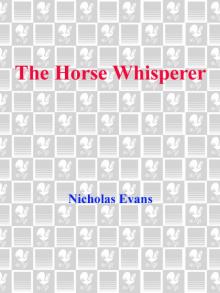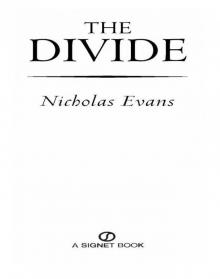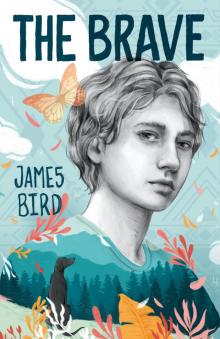- Home
- Nicholas Evans
The Loop Page 12
The Loop Read online
Page 12
Eleanor Calder stood in the doorway of Iverson’s grocery store and watched. All along the street others were doing the same.
The high school band had been practicing all morning and now, marching in the street in the glare of the noon sun, tempers had started to frazzle. They were supposed to be playing ‘Seventy-six Trombones’, which was probably someone’s idea of a joke for there was only one trombonist among them and even his survival was now in doubt because a cornet player, a girl twice his size, had just threatened to waste him if he poked her one more time in the back. Ignoring the shrill pleas of Nancy Schaeffer, their distraught teacher, everyone in the band was taking sides and screaming at each other while the cattle streamed like philistines around them.
Quite what the cattle were doing there, nobody seemed to know. Either they had misread their calendars and were on their way to the fairground or else someone had picked an inspired moment to move them to a pasture on the far side of town. Whichever it was, the men hanging the flags weren’t impressed. Their ladders were being jostled by the cattle until at last one of them took a head-on shove and toppled and the man had to leap for safety onto the porch roof of Nelly’s Diner just in time to watch his line of flags flutter down to garland the heads of the cows and be swept merrily away out of town.
Old Mr Iverson clucked and shook his head.
‘Gets worse every year,’ he said. ‘Even the band can’t play a half-decent tune anymore.’
‘Oh, they’ve got a couple of weeks to get it together,’ Eleanor said. ‘The cows don’t help.’
‘They sure make a better noise though.’
Eleanor smiled. ‘Well, I’d better be getting home. Some hungry men’ll be wanting their lunch.’
She said goodbye and made her way with her two sacks of groceries along the cracked sidewalk to where she had parked. Except for a few stragglers, the cattle had almost gone. Two young hands Eleanor didn’t recognize were bringing up the rear on horseback and taking abuse from storekeepers and some of the less patient drivers who’d been blocked in their cars. Band practice appeared to be over and the squabbling factions were dispersing.
Eleanor dumped her groceries into the back of her car and shut the tailgate, chiding herself for having bought so much. Like most of her neighbors, she normally went once a week to the big supermarket in Helena and only used Iverson’s for the odd thing she had forgotten to put on her list. On these rare visits, like today, she was always stricken with guilt and ended up buying all kinds of things she didn’t need. She was sure the Iversons, the lugubrious couple who had owned the place for as long as anyone could remember, recognized this as a syndrome and adjusted their expressions accordingly when anyone came in. They probably whooped and danced with glee when they had the place again to themselves.
Eleanor got into the car, wincing at the scald of the seat through her cotton dress. She was about to start the engine when she noticed the FOR SALE sign was still in the window of Ruth Michaels’ gift shop across the street. She thought yet again about what Kathy had said.
It was about a month ago, when they were changing little Buck’s diapers. Kathy mentioned that Paragon was up for sale and suggested Eleanor should consider buying it. Since she had gotten married, finding projects for her mother to get involved in was one of Kathy’s favorite pastimes. Eleanor had variously been told she should go to college, open a restaurant, start a mail-order business, take up yoga; maybe even do all of these at the same time. Now it was buying Ruth Michaels’ gift shop.
‘Don’t be silly,’ Eleanor said. ‘I wouldn’t have the first idea how to run it, let alone make a cup of cappuccino.’
‘You used to help out in Grandpa’s store. Anyhow, you wouldn’t have to. Ruth doesn’t want out. She’s just borrowed too much and can’t afford to keep going. You could buy into the business and let her go on running the place. Be involved as much or as little as you wanted.’
Every excuse she put up, Kathy neatly demolished and though it was never mentioned again, Eleanor had thought about it many times since. It might be just what she needed. With both girls now married and Luke soon off to college, she could do with something to fill the void.
In the old days, before Henry died, she used to handle a lot of the ranch paperwork that Kathy now looked after. And apart from cooking - which Eleanor was amazed to think she had once actually enjoyed - she barely got involved at all. She got so bored and lonely sometimes, she worried for her sanity.
She didn’t know Ruth Michaels, except to say hello to, but had always thought she seemed bright and pleasant. People had been both intrigued and a little suspicious of her when she’d first arrived in town some five years ago. To be more precise, the men had been intrigued and the women suspicious and for the same two reasons: her dark, exotic looks and the fact that she was single. By now she was accepted (or as much as any New Yorker ever would be) and generally liked.
On the few occasions Eleanor had gone into the shop, she had been impressed. It wasn’t the usual western tourist trash - plastic dream catchers, snowshakers and jokey cowboy T-shirts. Ruth had taste. You could see it in the selection of jewelry, books and pieces of artwork.
Before she had finally made up her mind, Eleanor found herself crossing the street, picking her way with care between what the cows had left behind and the last few bickering band members.
Ruth allowed people to stick notes and posters on a board in the shop window, announcing yard sales, unwanted puppies or upcoming events such as potlucks or weddings to which the whole town was invited. Most at the moment were to do with the fair and rodeo, including one that made Eleanor smile. Trombonists Urgently Wanted, it read. Call Nancy Schaeffer - NOW! Below it, a black cat basked asleep in the filtered sunshine.
There were bells on the door that clanked when it opened and closed. After the glare of the street, Eleanor’s eyes took a moment to adjust to the shadowed clutter of the shop. It was cool and calm and soothing music floated on the air along with a rich smell of coffee. There was no one to be seen.
Eleanor stepped carefully between tall dressers stacked with pottery and handmade toys and brightly colored Indian blankets, taking care not to knock the jungle of mobiles and chimes that hung from the ceiling, tinkling as they turned and touched. There were baskets of bracelets made of dyed and plaited horsehair and glass cabinets crammed with silver jewelry.
There were clunking and hissing noises coming from the rear of the shop, where the cappuccino bar was, and as Eleanor got nearer she heard Ruth’s voice.
‘Do it, you stupid bastard! Do it!’
There was nobody to be seen. Eleanor hesitated. She didn’t want to blunder into a private altercation.
‘I’ll give you one more chance and then I’m going to beat the living shit out of you, okay?’
There was a huge chrome coffee machine on the counter and suddenly it erupted with a terrifying squall of steam.
‘You shit! You lousy, useless godforsaken heap of shit!’
‘Hello?’ Eleanor said tentatively. ‘Is that Ruth?’
Everything went quiet.
‘Not if you’re from the bank or the IRS, it isn’t.’
Ruth’s head lifted slowly into view above the machine. There was a smudge of black oil on her cheek. When she saw Eleanor, her eyes seemed briefly to fill with panic. Then she beamed.
‘Mrs Calder! Hi! I’m sorry, I didn’t hear you. This machine will, probably literally, be the death of me. What can I do for you? Can I make you a coffee?’
‘Not if it’s going to explode.’
‘Oh, he only behaves badly when he thinks no one’s here.’
‘You’ve got something on your . . .’ She pointed to the smudge.
‘Oh. Thanks.’
She found a tissue and, using the coffee machine as a mirror, wiped it off.
‘Do you believe in ghosts?’
‘Yes, I think I do. Why?’
‘I swear this thing is haunted. I got it from a place that was closing do
wn in Seattle, really cheap. Now I know why. How about that coffee?’
‘Do you have decaf?’
‘You bet. Skim milk or regular?’
‘I’ll have skim.’
‘Why bother.’
‘Well, I . . .’
‘No, I mean, that’s what I call it. No caffeine, no fat, so why bother?’ She laughed. It was a catchy, throaty laugh, almost scurrilous, and it immediately had Eleanor laughing too.
‘Did you get caught in the stampede?’
‘Very nearly. Those poor children.’
‘Please, take a seat.’
Eleanor settled herself on one of the little bar stools while Ruth coaxed two cappuccinos from the machine. She was wearing faded jeans and a baggy purple T-shirt emblazoned with the shop’s name. Her black hair was bundled up in a red bandanna. Eleanor guessed she must be in her mid to late thirties and was struck by how attractive she was.
She wondered about that look of panic when Ruth saw her just now. Maybe she really had been expecting a visit from the IRS. She placed Eleanor’s coffee in front of her.
‘So, have you found a buyer yet?’ Eleanor asked. ‘Kathy said you were hoping to find a partner to come in with you.’
‘Did you see them all lining up outside? Nobody’s interested. ’
Eleanor sipped her coffee. It tasted good. Go on, she told herself, say it. She put the cup down.
‘Well,’ she said. ‘I might be.’
Buck figured the calf must have been dead a good few days. There wasn’t a whole lot left of it. But for a few bones and chewed-up strips of hide, its hindquarters had all but disappeared. The remains were lying exposed at the top of a steep gully and what the birds and other varmints hadn’t taken, the sun had baked stiff. Nat Thomas was having a hard time working out what had happened.
He was kneeling beside it, probing among the flies and maggots with his knife and forceps. The ground around him was alive with grasshoppers. Nat and his father before him had been vets to the Calder ranch for years and Buck had called him right away. He wanted to get an independent opinion before the feds got their itchy hands on the carcass. They’d come clean about it being a wolf that had killed Prince, but given that Kathy had seen the damn thing with her own eyes, they hadn’t had much choice.
Buck didn’t like the guy from Fish and Wildlife, Prior or whatever he called himself. He didn’t trust him either. The other one, Rimmer, the predator-control fellow, seemed okay, but when it came to the crunch, whatever they might pretend, feds were feds and wolf lovers, every goddamn one of them.
Buck was standing with Clyde, looking over Nat’s shoulder. It was noon and the heat shimmered off the rocks that dotted the pasture. The only sounds were the flick of the grasshoppers and now and again the call of a cow farther up toward the forest. Buck was still sweating from the steep walk up here. They’d left Nat’s car down at the house and the three of them had driven up as far as they could get in Clyde’s truck. They’d had to leave it about a half-mile farther down the slope where the land got too rough. It would have been better to come up on horseback.
It was Clyde who had found the calf this morning and what riled Buck was why Luke hadn’t found it earlier. He had given the boy the job of riding the herd up here on the allotment as soon as Prince got killed. If there were wolves around, someone needed to keep watch on the cattle and as Luke knew the lie of the land and wasn’t a whole lot of use at much else, it might as well be him.
Buck had told him to keep an eye out for exactly this kind of thing and the boy hadn’t found it. Probably because he spent most of the time with his head in the clouds, dreaming and reading books or scrabbling around for bits of old bone or whatever. How Buck was ever going to make a half-decent rancher out of him, he had no idea.
‘Well, Nat, what d’you reckon?’
‘Sure ain’t too much to go on.’
‘How long’s he been dead?’
‘Oh, three, four days maybe.’
‘Reckon it was a wolf?’
‘Well, he’s been chewed up real good. See these teeth marks here on the neck? That’s a predator with a fair-sized jaw and it sure doesn’t look like a bear. Could be a wolf or a coyote. Have you looked around for tracks?’
‘Too dry,’ Clyde said. ‘And you can’t see the ground for grasshoppers.’
‘Could be he was already dead and whatever it was has just been chewing on him.’
‘My cows don’t go falling over dead of their own accord, Nat. You know that.’
‘Sure, but from all that’s left of him here, he could have been struck by lightning, anything—’
‘Struck by lightning. Give me a break, Nat.’
‘Well.’
Buck looked down at the carcass. He noticed something and bent to pick it up. It was a scrap of hide, hardened by the sun. On it was the linked HC brand of the Calder ranch. He blew a grasshopper off it and turned it over in his fingers.
Sure, you got to lose a calf from time to time up here. Sometimes one got sick or got himself stuck in a gulch somewhere. A few years back they’d lost a couple to an old grizzly and a predator-control agent had come and taken it out. If you were ranching this kind of country, losing the occasional calf was part of the deal.
But for the last two falls every animal that had summered on the allotment had come back safe and sound. And seeing his brand on this piece of hide, Buck felt a surge of anger.
He knew in his bones that a wolf was to blame and he was damn well going to prove it. It was probably the same one that killed Kathy’s dog, one of those varmints the goddamn feds had let loose in Yellowstone. And they expected you to stand by and serve it five-hundred-dollar calves for its dinner! It made a man sick. Buck wasn’t going to stand for it.
He slung the piece of hide away and watched it curve like a skimming stone down into the gully.
‘So, Nat, are you prepared to back me on it being a wolf or not?’
The vet stood up and scratched his head. Buck could see how uncomfortable he was, being put on the spot. The two men had known each other since they were kids. Both were aware that Nat and his father had made good money from the work the ranch provided.
‘Well, Buck, you know, it’s a tough call.’
‘Well, he sure didn’t die of old age.’
‘Maybe not, but—’
‘And you said it wasn’t a bear.’
‘I can’t say for sure it wasn’t.’
Buck put his arm around the vet’s shoulders. Nat was short and Buck towered over him like an uncle.
‘You’re a good friend, Nat, and I don’t want to put words in your mouth. But you know what these bunny-huggers are like. They’ll do all they can to pretend it isn’t one of their precious wolves that did it. All I want is your best opinion, just a little ammunition.’
‘Well, maybe.’
‘Maybe isn’t going to cut a lot of snuff with these fellas. What are you saying, that it’s ninety percent certain it was a wolf? Eighty? You tell me.’
‘That’s pushing it, Buck.’
‘Seventy-five then.’
‘Well, I dunno. Maybe.’
‘Seventy-five. Okay.’ Buck took his arm off the vet’s shoulders. He’d got what he wanted. ‘Well, thank you Nat. I appreciate it, old buddy. You can put the tarp back now, Clyde.’
They’d brought an old green tarpaulin up in the truck and Clyde swung it over the carcass, sending up a cloud of grasshoppers. Nat Thomas looked at his watch and said he was already running late on his calls and had better get going. Buck knew the poor fellow just didn’t fancy being around when the feds got here. Buck slapped him on the back and they set off down the hill.
‘I’ll drive you down. Come on Clyde, let’s go call the bunny-huggers.’
‘Luke? Are you coming to eat?’
Luke opened his eyes and saw his mother standing beside the bed, looking down at him.
‘Are you all right?’
‘Yeah, I was doing some exercises and must have dr
opped off.’
She stroked the hair from his forehead and smiled, but he could see in her eyes that something was wrong. He sat up, swung his legs off the bed and started pulling on his boots.
‘What’s the matter?’
She looked away and sighed.
‘Mom?’
‘Clyde found a dead calf. Your father’s making a big thing of it.’
‘W-where?’
‘Oh, somewhere, I don’t know.’
‘Up on the allotment?’
She looked at him and nodded.
‘And he thinks it’s a w-w-wolf?’
‘Yes. And so does Nat Thomas. Come on, everybody’s down there. Let’s get it over with.’
He followed her out and along the corridor toward the top of the stairs. What was he going to say? He knew his father would blame him. How on earth had Clyde found it? And what was he doing checking up on him anyway?
Luke had come across the carcass two days ago. There were fresh wolf tracks in the dust and some scat too. He’d dragged the calf down into the gully and covered it with rocks. He’d broken off a branch of limber pine and brushed away the tracks, then gotten rid of the scat. He’d figured no one was going to know anything until the fall when the cattle came down and got counted.
As he walked toward the kitchen doorway, Luke could hear them all chatting. Clyde was laughing and telling the two hands who were helping with the haying, Ray and Jesse, what Nat Thomas had said. But he stopped as soon as Luke stepped into the room. Everyone looked up at him. His father was sitting at the head of the table.
‘Hi, Luke,’ he said. ‘Had a good sleep?’
‘I w-w-was—’
‘Come and eat. It’s going cold.’
Luke sat next to Ray, who gave him a nod.
‘How’re you doing, Luke?’
‘G-g-good. ‘
His mother was cutting him a slice of meat loaf, which was one of the few meat dishes he actually enjoyed, though right now he didn’t feel hungry at all. Everyone else had almost finished.
‘Anyhow,’ Clyde went on. ‘He’s scratching his head and getting all fidgety and saying how it’s a real tough call and all, and so Buck here says, “Well, Nat, he sure didn’t die of old age!”’

 The Horse Whisperer
The Horse Whisperer The Divide
The Divide The Smoke Jumper
The Smoke Jumper The Brave
The Brave The Loop
The Loop